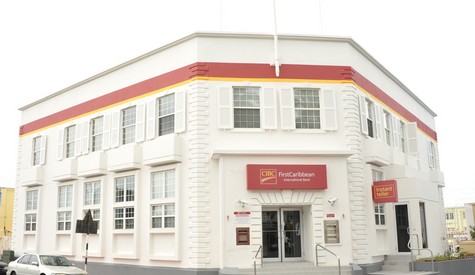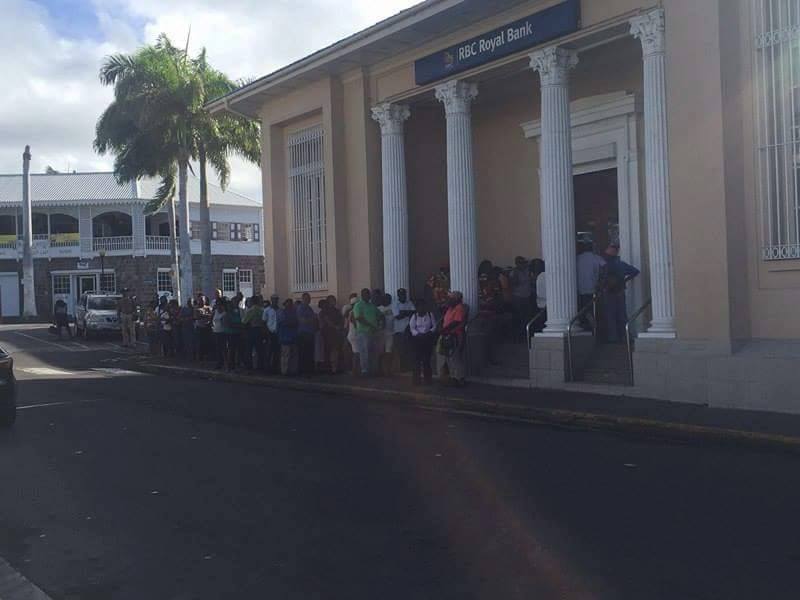BASSETERRE, ST. KITTS – The interest rate on domestic savings accounts at CIBC FirstCaribbean Bank in St. Kitts and Nevis and Barbados has been slashed.
While Royal Bank of Canada (RBC) will introduce lower rates in Barbados, there is no official word on any planned changes for RBC customers in St. Kitts and Nevis.
The change in rates at CIBC FirstCaribbean in St. Kitts and Nevis has been confirmed by an official at the St. Kitts Branch in The Circus.
The confirmation comes following a report from Barbados that CIBC FirstCaribbean has slashed its deposits rate to between 0.15 and 0.5 percent.
It is also being reported that customers of the Royal Bank of Canada (RBC) in Barbados have been put on notice that their savings rate is about a hit an all-time low of 0.01 percent.
Chad Allen, the Country Manager for Royal Bank of Canada (RBC) in St. Kitts and Nevis said Monday he had no official communication from headquarters of any changes in St. Kitts and Nevis.
While the new rates at CIBC FirstCaribbean took effect from February 1st 2017, the new rates for RBC customers in Barbados take effect from March 1st 2017.
In Barbados, the RBC changes will affect customers with RBC’s Day to Day Savings, Enhanced Savings, Leo Young Savers and SixtyPlus accounts, and essentially means that those deposit accounts with a minimum $100 will only be able to attract one cent in savings interest.
The move by the two Canada-headquartered banks in Barbados is still seen as a major blow for local depositors, who prior to April 2015 were guaranteed a minimum interest rate of 2.5 per cent until the Central Bank decided to de-regulate the market.
In an immediate response, former head of the Barbados Bankers’ Association Horace Cobham suggested that the Central Bank may need to make an about turn in the interest of local customers, who he said were clearly not reaping the benefits of the current surplus in the banking system.
The former RBC head said though he clearly understood that commercial banks were “caught in a quandary” given the current uncertainty in the marketplace, there was no reason why customers should not be guaranteed “a decent rate of return”.
Therefore, he suggested the need for better policing of the banking sector and the reopening of discussion on a minimum savings rate.
“Perhaps there is need for some half-way house, where there is some minimum rate of return,” Cobham told Barbados TODAY, while lamenting that “too often it becomes self-interest and you have to force banks to do what is right in small economies like those which exist in the Caribbean”.
As for what could be considered a decent minimum savings rate, the former banker acknowledged it was by no means an easy policy position to take. In fact, he suggested that the matter might even go above the head of the country’s Central Bank, since it would amount to a significant shift in Government policy.
“It probably isn’t three per cent. It probably might be closer to a one per cent,” he added.
The former banker acknowledged the right of commercial banks to a decent rate of return.
However, he said those who operate in Barbados needed to be more cognizant of the small size of the market and the limited investment options available to them.
“That is why . . . you need a successful domestic bank or regional bank in every society because [they] see their market as the market in which they operate, whereas international banks always have a foot in the door and one outside; meaning when they are looking at an investment they compare making the investment in Barbados versus making the investment in wherever,” he explained.
Cobham also challenged the notion that lending rates were coming down at the same pace as those which apply to savings, saying, “they have lowered lending rates, but not to the same extent they have lowered deposit rates. So their [profit] margins have increased.”
Prior to the Barbados Central Bank’s removal of the minimum savings rate, which was in place from 1991 and 2015, interest on loans and mortgages ranged from seven to nine per cent. However, since April 2015, interest on loans has been reduced to between four and six per cent.
In May last year, the St. Kitts-based Eastern Caribbean Central Bank (ECCB) expressed concern about the increase in commercial banks’ fees and charges across the Eastern Caribbean Currency Union (ECCU) and the effects on depositors while advising that it has no authority to regulate the banks.
*This article was posted in its entirety as received by SKN PULSE. This media house does not correct any spelling or grammatical errors within press releases and (or) commentaries. The views contained within are not necessarily those of SKN PULSE.














